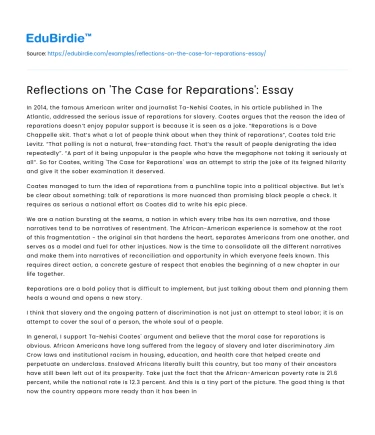In 2014, the famous American writer and journalist Ta-Nehisi Coates, in his article published in The Atlantic, addressed the serious issue of reparations for slavery. Coates argues that the reason the idea of reparations doesn’t enjoy popular support is because it is seen as a joke. “Reparations is a Dave Chappelle skit. That’s what a lot of people think about when they think of reparations”, Coates told Eric Levitz. “That polling is not a natural, free-standing fact. That’s the result of people denigrating the idea repeatedly”. “A part of it being unpopular is the people who have the megaphone not taking it seriously at all”. So for Coates, writing 'The Case for Reparations' was an attempt to strip the joke of its feigned hilarity and give it the sober examination it deserved.
Coates managed to turn the idea of reparations from a punchline topic into a political objective. But let's be clear about something: talk of reparations is more nuanced than promising black people a check. It requires as serious a national effort as Coates did to write his epic piece.
Save your time!
We can take care of your essay
- Proper editing and formatting
- Free revision, title page, and bibliography
- Flexible prices and money-back guarantee
We are a nation bursting at the seams, a nation in which every tribe has its own narrative, and those narratives tend to be narratives of resentment. The African-American experience is somehow at the root of this fragmentation - the original sin that hardens the heart, separates Americans from one another, and serves as a model and fuel for other injustices. Now is the time to consolidate all the different narratives and make them into narratives of reconciliation and opportunity in which everyone feels known. This requires direct action, a concrete gesture of respect that enables the beginning of a new chapter in our life together.
Reparations are a bold policy that is difficult to implement, but just talking about them and planning them heals a wound and opens a new story.
I think that slavery and the ongoing pattern of discrimination is not just an attempt to steal labor; it is an attempt to cover the soul of a person, the whole soul of a people.
In general, I support Ta-Nehisi Coates' argument and believe that the moral case for reparations is obvious. African Americans have long suffered from the legacy of slavery and later discriminatory Jim Crow laws and institutional racism in housing, education, and health care that helped create and perpetuate an underclass. Enslaved Africans literally built this country, but too many of their ancestors have still been left out of its prosperity. Take just the fact that the African-American poverty rate is 21.6 percent, while the national rate is 12.3 percent. And this is a tiny part of the picture. The good thing is that now the country appears more ready than it has been in years to try to come to grips with the sins of the past.






 Stuck on your essay?
Stuck on your essay?

